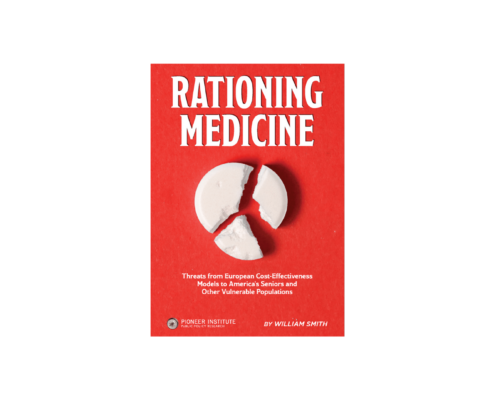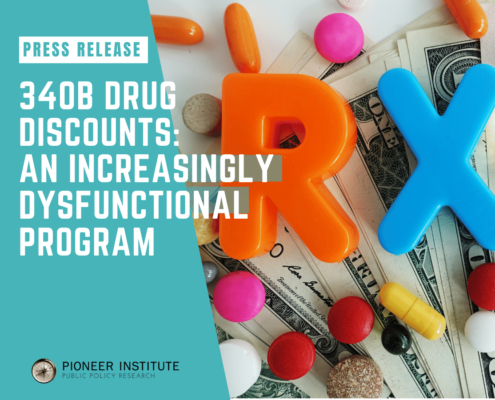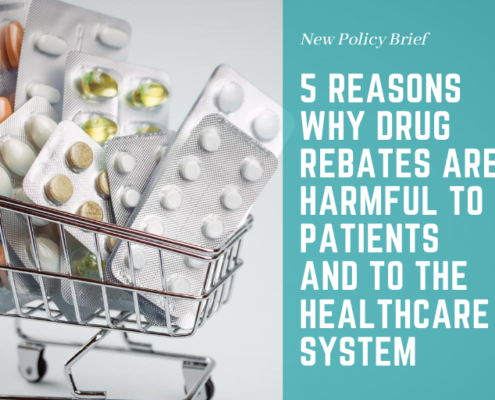
‘High’ U.S. Drug Prices Mask Freeloading by Other Nations
The drug company’s choice is to walk away from millions in revenue from a given country and deny their people a lifesaving drug, or swallow hard and accept an unfair price that is nowhere near the drug’s value. For the sake of shareholders and patients, drug companies typically accept the unfair price and devote the revenue to offsetting their previous investments. In short, other nations are freeloading off of American R&D.

A nuclear winter is coming for biopharma
The life sciences sector in Massachusetts — which has been flying so high for so long — is about to experience a very hard landing. With the adoption of prescription drug price controls in the Inflation Reduction Act (IRA), drug research and development — the heart of the life sciences sector in Massachusetts — is about to experience a nuclear winter.

Pioneer Study: Study Finds Patent Protections Fuel Biopharma Innovation that Helps Patients
Patent protections on new drugs have unleashed an unprecedented wave of innovation that has benefited patients and should be fiercely guarded, according to a new study published by Pioneer Institute. New research indicates that price controls contained in the Inflation Reduction Act will result in 230 fewer drugs coming to market over the next decade and job losses of between 730,000 and 1.1 million.

Ron DeSantis’ Silly Drug Importation Idea
Ron DeSantis proposed in November 2020 to import drugs from Canada for state agencies such as Medicaid, prisons and other public healthcare programs. The goal is to save $150 million in state taxpayer funds. But the Biden administration seems unlikely to approve the plan, and the FDA has raised objections. Here's why the DeSantis plan will not — and cannot — save even a dollar.

University Science Research Is Under Threat
The Biden administration's formation of a working group to “develop a framework for the implementation of the march-in provision of the Bayh-Dole Act" could have serious adverse consequences for university research and biopharmaceutical innovation. It represents a particularly dangerous threat to the thriving life sciences cluster in Greater Boston.

Lousy Healthcare for Thee but Not for Me
In recent years, pharmacy benefit managers (PBMs) have instituted programs to keep out-of-pocket drug costs high for patients. Why is the administration so eager to protect federal employees from high out-of-pocket costs but is perfectly happy for PBMs to enroll millions of other patients in these programs?

Out-of-Pocket Pirates: Spotlight on Accumulator & Maximizer Programs
A new white paper, "Out-of-Pocket Pirates: Pharmacy Benefit Managers (PBMs) and the Confiscation of Copayment Assistance Programs," examines how the way these programs are implemented is having negative impacts on patients living with serious diseases.

New Book Highlights the Negative Impacts of Controversial QALY Value Assessment Framework on Patient Access & Affordability
Pioneer Institute has released a new compilation of research regarding the impact of the Quality Adjusted Life Year (QALY) methodology on the ability of patients, including some of the most vulnerable patient communities, to access treatments. The Pioneer book, Rationing Medicine: Threats from European Cost-Effectiveness Models to America's Seniors and other Vulnerable Populations, is authored by Dr. Bill Smith, Senior Fellow and Director of the Life Sciences Initiative at Pioneer Institute, and compiles research and data about the discriminatory nature of the QALY for aging adults, those living with disabilities or rare diseases, and more.

Comments on How Pharmacy Benefit Managers (PBMs) affect Smaller Pharmacies and Consumers (ID FTC-2022-0015-0001)
Pioneer Institute Senior Fellows William Smith and Robert Popovian submitted public comments about PBM business practices to the Federal Trade Commission (FTC). Pioneer recommended that PBM discounts be passed along to patients when they are meeting their deductible or coinsurance requirements.

340B Drug Discounts: An Increasingly Dysfunctional Program
This report reviews the federal 340B drug discount program, showing that, over the past decade, the revenue for hospitals generated by the program, initially intended to serve low-income, uninsured populations, has exploded even while a number of important Massachusetts hospitals have reduced the level of charity care they provide. The study notes that nationwide, 340B drug sales rose from $9 billion in 2014 to $38 billion in 2020.

Testimony in opposition to S. 2651 to impose price controls
Testimony submitted on February 4, 2022 in opposition to S. 2651, legislation that would impose price controls on one of Massachusetts most important economic sectors, biopharmaceuticals.

An Act advancing health care research and decision-making centered on patients and people with disabilities
On November 9th, 2021, William Smith, Pioneer Institute Visiting Fellow in Life Sciences, submitted the following testimony to the Massachusetts Legislature in support of House Bill 201, which addresses a number of flaws and infirmities in the Quality Adjusted Life Years (QALYs) methodology that is utilized by a number of foreign nations in evaluating the value of medicines.

An “Impending Tsunami” in Mortality from Traditional Diseases?
This report examines whether, after the COVID-19 pandemic subsides, the U.S. will have another looming public health crisis emerging from patients failing to have had their cardiology needs addressed properly during the lockdowns. Moreover, if we surmise that a follow-on public health crisis will emerge, we can also conclude that certain population segments are going to be more impacted by CVD, as there are documented health disparities in this therapeutic area. Finally, there are policy changes that could be taken to mitigate a possible spike in CVD adverse events; the paper will close by recommending certain policy changes.

The QALY and Cancer Treatments: An Ill-Advised Match
This report examines the alarming methodological and contextual shortcomings of the Quality Adjusted Life Years (QALY)-based methodology in evaluating new cancer therapies. It reveals five specific problems with ICER’s evaluation of cancer treatments and demonstrates the urgent need to prohibit the use of the QALY amid trends in rapid cancer innovations and personalized medicine.

Antimicrobial Resistance: Learning from the current global health crisis to prevent another one
0 Comments
/
The world was blindsided by COVID-19, but a new study finds that…

Five Reasons Why Drug Rebates Are Harmful to Patients and to the Healthcare System
Ever-larger rebates are distorting the market for branded drugs and producing outcomes that often benefit neither consumers nor the healthcare system, according to a new study published by Pioneer Institute.

The Negative Impact of COVID-19 Upon the Biopharmaceutical Sector
Contrary to conventional wisdom that says the coronavirus pandemic will generally benefit biopharmaceutical companies, a new Pioneer Institute study finds many companies will emerge from the pandemic commercially weaker, dealing with delays in new product launches and with fewer resources to invest in research and development.

Quality Adjusted Life Years (QALY): The Threat to Older Americans
This report examines how the QALY methodology to determine drug treatment value threatens to discriminate against older adults by placing a lower value on treatments that would extend the life of or improve quality of life for older patients. This clear bias against providing access to therapies to seniors comes at a critical and especially vulnerable time for older Americans given the coronavirus disease (COVID-19).

The Legality of QALY under the ADA
This new report outlines several potential legal violations and negative implications for disabled individuals related to the adoption of the quality adjusted life years (QALY) approach to drug value assessment, used most prominently by the Institute for Clinical and Economic Review (ICER).

Looming Challenges for ICER in Assessing the Value of Rare Disease Therapies
This report examines why the Institute for Clinical and Economic Review (ICER) and the Quality Adjusted Life Years (QALY) approach to value assessment is particularly ill-suited to assess the cost-effectiveness of orphan and rare disease treatments, which represent a rapidly growing sector of the biopharmaceutical marketplace.

Key Questions for Legislators on the Institute for Clinical and Economic Review (ICER)
As states continue to grapple with prescription drug costs, a new Pioneer Institute study lays out the key ethical, methodological and disease-specific questions policy makers should address before deciding whether to contract with the Institute for Clinical and Economic Review (ICER) to conduct cost effectiveness reviews used to make decisions about the purchase of medicines and other medical innovations.

Will New England See Lower Prices from Drug Pricing Transparency Legislation?
This report finds that most new drug pricing transparency laws do not lower consumer out-of-pocket costs, and that expensive and onerous compliance rules would likely put upward pressure on prices. The report reviews recent New England legislative attempts to reduce costs by requiring the disclosure of wholesale drug prices and other information about industry pricing practices.

Transparency in Retail Drug Prices: Easy to Obtain but Accuracy May Be Doubtful
This paper is the fourth in a series on price transparency in the healthcare industry, and the first Pioneer report to focus on the retail price of prescription medications. Researchers called 44 retail drug stores across the state asking for the price of a 30-day supply of each drug in a common dosage. In each case the callers said they were self-pay and pressed the drug store for information about discounts.

Are Drug Prices Driving Healthcare Cost Growth?
This report illustrates that state policy and legislative recommendations requiring pharmaceutical companies to disclose proprietary information would discourage the development of new innovative medicines, lead to higher healthcare costs over the long term, and potentially damage a big driver of Massachusetts' business economy.
